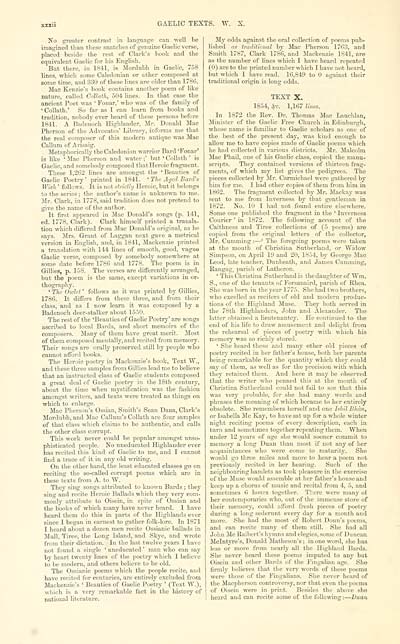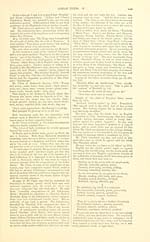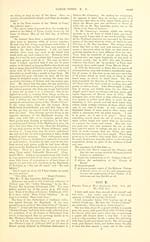Download files
Complete book:
Individual page:
Thumbnail gallery: Grid view | List view

GAELIC TEXTS. W. X.
can well be
2;enuine Gaelic vei-se,
No greater contrast in Ian
imagined than these snatches of ^
placed beside the rest of Clark's book and the
equivalent Gaelic for his English.
But there, in 1841, is Mordubh in Gaelic, 758
lines, which some Caledonian or other composed at
some time, and 330 of these lines are older than 1786.
Mao Kenzie's book contains another poem of like
nature, called Collath, 504 lines. In that case the
ancient Poet was ' Fonar,' who was of the family of
'Collath.' So far as I can learn from books and
tradition, nobody ever beard of these persons before
1841. A Badenoch Highlander, Mr. Donald Mac
Pherson of the Advocates' Library, informs me that
the real composer of this modern antique was Mac
Galium of Arisaig.
iletaphorically the Caledonian warrior Bard 'Fonar'
is like ' 2ilac Pherson and water ;' but ' Collath ' is
Gaelic, and somebody composed that Heroic fragment.
These 1,262 lines are amongst the 'Beauties of
Gaehc Poetry' printed in 1841. ' The Aged Bard's
Wisli ' follows. It is not stridhj Heroic, but it belongs
to the series ; the author's name is unknown to me.
Mr. Clark, in 1778, said tradition does not pretend to
give the name of the author.
It first appeared in Mac Donald's songs (p. 141,
ed. 1778, Clark). Clark himself printed a transla-
tion which differed from Mac Donald's original, as he
says. Mrs. Grant of Laggan next gave a metrical
version in English, and, in 1841, Mackenzie printed
a translation with 144 lines of smooth, good, vague
Gaelic verse, composed by somebody somewhere at
some date before 1786 and 1778. The poem is in
Gillies, p. 158. The verses are differently arranged,
but the poem is the same, except variations in or-
thography.
' The Oivlet ' follows as it was printed by Gillies,
1786. It differs from these three, and from their
class, and as 1 now learn it was composed by a
Badenoch deer-stalker about 1550.
The rest of the 'Beauties of Gaelic Poetry' are songs
ascribed to local Bards, and short memoirs of tho
composers. Many of them have great merit. Most
of them composed mentally, and recited from memory.
Their songs are orally preserved still by people who
cannot afford books.
The Heroic poetry in Mackenzie's book, Text W.,
and these three samples from Gillies lead me to believe
that an instructed class of Gaelic students composed
a great deal of Gaelic poetry in the 18th century,
about the time when mystification was the fashion
amongst writers, and texts were treated as things on
which to enlarge.
Mac Pherson's Ossian, Smith's Sean Dana, Clark's
Mordubh, and Mac Callum's Collath are four samples
of that class which claims to be authentic, and calls
the other class corrupt.
This work never could be popular amongst unso-
phisticated people. No uneducated Highlander ever
has recited this kind of Gaelic to me, and I cannot
find a trace of it in any old writing.
On the other hand, the least educated classes go on
reciting the so-called corrupt poems which are in
these texts from A. to W.
They sing songs attributed to kno\vn Bards ; they
sing and recite Heroic Ballads which they very com-
monly attribute to Gisein, in spite of Ossian and
the books of which many have never heard. I have
heard them do this in parts of the Highlands ever
since I began in earnest to gather folk-lore. In 1871
I heard about a dozen men recite Ossianic ballads in
Mull, Tiree, the Long Island, and Skye, and wrote
from their dictation. In the last twelve years I have
not found a single ' uneducated ' man who can say
by heart twenty lines of the poetry which I believe
to be modern, and others believe to be old.
The Ossianic poems which the people recite, and
have recited for centuries, are entirely excluded fi-om
Mackenzie's ' Beauties of Gaelic Poetry ' (Text W.),
which is a very remarkable fact in the history of
national literature.
My odds against the oral collection of poems pub-
lished OS iraditional by Mac Pherson 1763, and
Smith 1787, Clark 1786, and Mackenzie 1841, are
as the number of lines which I have heard repeated
(0) are to the printed number which I have not heard,
but which I have read. 16,849 to against their
traditional origin is long odds.
TEXT X.
1854, ^a. 1,167 lines.
In 1872 the Rev. Dr. Thomas Mac Lauchlan,
Minister of the Gaelic Free Church in Edinburgh,
whose name is familiar to Gaelic scholars as one of
the best of the present day, was kind enough to
allow me to have copies made of Gaelic poems which
he had collected in various districts. Mr. ilalcolm
Mac Phail, one of his Gaelic class, copied the manu-
scripts. They contained versions of thirteen frag-
ments, of which my list gives the pedigrees. The
pieces collected by Mr. Carmichael were gathered by
him for me. I had other copies of them from him in
1862. The fragment collected by Mr. Mackay was
sent to me fi'om Inverness by that gentleman in
1872. No. 10 I had not found entire el.sewhere.
Some one published the fragment in the ' Inverness
Courier ' in 1872. The following account of the
Caithness and Tiree collections of (5 poems) are
copied from the original letters of the collector,
Mr. Cumming : — ' The foregoing poems were taken
at the mouth of Christina Sutlierland, or Widow
Simpson, on April 19 and 20, 1854, by George Mac
Leod, late teacher, Dunbeath, and James Cumming,
Rangag, parish of Latheron.
' This Christina Sutherland is thedaughter of Wm.
S., one of the tenants of Forsanaird, parish of Rhea.
She was born in the year 1775. She had two brothers,
who excelled as reciters of old and modern produc-
tions of the Highland Muse. They both served in
the 78th Highlanders, John and Alexander. The
latter obtained a lieutenantoy. He continued to the
end of his life to draw amusement and delight from
the rehearsal of pieces of poetry with which his
memory was so richly stored.
' She heard these and many other old pieces of
poetry recited in her father's house, both her parents
being remarkable for the quantity which they could
say of them, as well as for the precision with which
they i-etained them. And here it may be observed
that the writer who penned this at the mouth of
Christina Sutherland could not fail to see that this
was very probable, for she had many words and
phrases the meaning of which became to her entirely
obsolete. She remembers herself and one Ishil Bhiin,
or Isabella Mc Kay, to have sat up for a whole vrinter
night reciting poems of every description, each in
turn and sometimes together repeating them. When
under 12 years of age she would sooner commit to
memory a long Duan than most if not any of her
acquaintances who were come to maturity. She
would go three miles and more to hear a poem not
previously recited in her hearing. Such of the
neighbouring hamlets as took pleasure in the exercise
of the Muse would assemble at her father's house and
keep up a chorus of music and recital from 4, 5, and
sometimes 6 hours together. There were many of
her contemporaries who, out of the immense store of
their memory, could aflbrd fresh pieces of poetry
during a long sederunt every day lor a month and
more. She had the most of Robert Doun's poems,
and can recite many of them still. She had all
John Mc Raibert's hymns and elegies, some of Duncan
Mclntyre's, Donald Matheson's ; in one word, she has
less or more from nearly all tho Highland Bards.
She never heard these poems imputed to any but
Gisein and other Bards of the FingaUan age. She
firmly believes that the very words of these poems
were those of the Fingalians. She never heard of
the Macpherson controversy, nor that even the poems
of Oisein were in print. Besides the above she
heard and can recite some of tho following : — Duan
can well be
2;enuine Gaelic vei-se,
No greater contrast in Ian
imagined than these snatches of ^
placed beside the rest of Clark's book and the
equivalent Gaelic for his English.
But there, in 1841, is Mordubh in Gaelic, 758
lines, which some Caledonian or other composed at
some time, and 330 of these lines are older than 1786.
Mao Kenzie's book contains another poem of like
nature, called Collath, 504 lines. In that case the
ancient Poet was ' Fonar,' who was of the family of
'Collath.' So far as I can learn from books and
tradition, nobody ever beard of these persons before
1841. A Badenoch Highlander, Mr. Donald Mac
Pherson of the Advocates' Library, informs me that
the real composer of this modern antique was Mac
Galium of Arisaig.
iletaphorically the Caledonian warrior Bard 'Fonar'
is like ' 2ilac Pherson and water ;' but ' Collath ' is
Gaelic, and somebody composed that Heroic fragment.
These 1,262 lines are amongst the 'Beauties of
Gaehc Poetry' printed in 1841. ' The Aged Bard's
Wisli ' follows. It is not stridhj Heroic, but it belongs
to the series ; the author's name is unknown to me.
Mr. Clark, in 1778, said tradition does not pretend to
give the name of the author.
It first appeared in Mac Donald's songs (p. 141,
ed. 1778, Clark). Clark himself printed a transla-
tion which differed from Mac Donald's original, as he
says. Mrs. Grant of Laggan next gave a metrical
version in English, and, in 1841, Mackenzie printed
a translation with 144 lines of smooth, good, vague
Gaelic verse, composed by somebody somewhere at
some date before 1786 and 1778. The poem is in
Gillies, p. 158. The verses are differently arranged,
but the poem is the same, except variations in or-
thography.
' The Oivlet ' follows as it was printed by Gillies,
1786. It differs from these three, and from their
class, and as 1 now learn it was composed by a
Badenoch deer-stalker about 1550.
The rest of the 'Beauties of Gaelic Poetry' are songs
ascribed to local Bards, and short memoirs of tho
composers. Many of them have great merit. Most
of them composed mentally, and recited from memory.
Their songs are orally preserved still by people who
cannot afford books.
The Heroic poetry in Mackenzie's book, Text W.,
and these three samples from Gillies lead me to believe
that an instructed class of Gaelic students composed
a great deal of Gaelic poetry in the 18th century,
about the time when mystification was the fashion
amongst writers, and texts were treated as things on
which to enlarge.
Mac Pherson's Ossian, Smith's Sean Dana, Clark's
Mordubh, and Mac Callum's Collath are four samples
of that class which claims to be authentic, and calls
the other class corrupt.
This work never could be popular amongst unso-
phisticated people. No uneducated Highlander ever
has recited this kind of Gaelic to me, and I cannot
find a trace of it in any old writing.
On the other hand, the least educated classes go on
reciting the so-called corrupt poems which are in
these texts from A. to W.
They sing songs attributed to kno\vn Bards ; they
sing and recite Heroic Ballads which they very com-
monly attribute to Gisein, in spite of Ossian and
the books of which many have never heard. I have
heard them do this in parts of the Highlands ever
since I began in earnest to gather folk-lore. In 1871
I heard about a dozen men recite Ossianic ballads in
Mull, Tiree, the Long Island, and Skye, and wrote
from their dictation. In the last twelve years I have
not found a single ' uneducated ' man who can say
by heart twenty lines of the poetry which I believe
to be modern, and others believe to be old.
The Ossianic poems which the people recite, and
have recited for centuries, are entirely excluded fi-om
Mackenzie's ' Beauties of Gaelic Poetry ' (Text W.),
which is a very remarkable fact in the history of
national literature.
My odds against the oral collection of poems pub-
lished OS iraditional by Mac Pherson 1763, and
Smith 1787, Clark 1786, and Mackenzie 1841, are
as the number of lines which I have heard repeated
(0) are to the printed number which I have not heard,
but which I have read. 16,849 to against their
traditional origin is long odds.
TEXT X.
1854, ^a. 1,167 lines.
In 1872 the Rev. Dr. Thomas Mac Lauchlan,
Minister of the Gaelic Free Church in Edinburgh,
whose name is familiar to Gaelic scholars as one of
the best of the present day, was kind enough to
allow me to have copies made of Gaelic poems which
he had collected in various districts. Mr. ilalcolm
Mac Phail, one of his Gaelic class, copied the manu-
scripts. They contained versions of thirteen frag-
ments, of which my list gives the pedigrees. The
pieces collected by Mr. Carmichael were gathered by
him for me. I had other copies of them from him in
1862. The fragment collected by Mr. Mackay was
sent to me fi'om Inverness by that gentleman in
1872. No. 10 I had not found entire el.sewhere.
Some one published the fragment in the ' Inverness
Courier ' in 1872. The following account of the
Caithness and Tiree collections of (5 poems) are
copied from the original letters of the collector,
Mr. Cumming : — ' The foregoing poems were taken
at the mouth of Christina Sutlierland, or Widow
Simpson, on April 19 and 20, 1854, by George Mac
Leod, late teacher, Dunbeath, and James Cumming,
Rangag, parish of Latheron.
' This Christina Sutherland is thedaughter of Wm.
S., one of the tenants of Forsanaird, parish of Rhea.
She was born in the year 1775. She had two brothers,
who excelled as reciters of old and modern produc-
tions of the Highland Muse. They both served in
the 78th Highlanders, John and Alexander. The
latter obtained a lieutenantoy. He continued to the
end of his life to draw amusement and delight from
the rehearsal of pieces of poetry with which his
memory was so richly stored.
' She heard these and many other old pieces of
poetry recited in her father's house, both her parents
being remarkable for the quantity which they could
say of them, as well as for the precision with which
they i-etained them. And here it may be observed
that the writer who penned this at the mouth of
Christina Sutherland could not fail to see that this
was very probable, for she had many words and
phrases the meaning of which became to her entirely
obsolete. She remembers herself and one Ishil Bhiin,
or Isabella Mc Kay, to have sat up for a whole vrinter
night reciting poems of every description, each in
turn and sometimes together repeating them. When
under 12 years of age she would sooner commit to
memory a long Duan than most if not any of her
acquaintances who were come to maturity. She
would go three miles and more to hear a poem not
previously recited in her hearing. Such of the
neighbouring hamlets as took pleasure in the exercise
of the Muse would assemble at her father's house and
keep up a chorus of music and recital from 4, 5, and
sometimes 6 hours together. There were many of
her contemporaries who, out of the immense store of
their memory, could aflbrd fresh pieces of poetry
during a long sederunt every day lor a month and
more. She had the most of Robert Doun's poems,
and can recite many of them still. She had all
John Mc Raibert's hymns and elegies, some of Duncan
Mclntyre's, Donald Matheson's ; in one word, she has
less or more from nearly all tho Highland Bards.
She never heard these poems imputed to any but
Gisein and other Bards of the FingaUan age. She
firmly believes that the very words of these poems
were those of the Fingalians. She never heard of
the Macpherson controversy, nor that even the poems
of Oisein were in print. Besides the above she
heard and can recite some of tho following : — Duan
Set display mode to: Large image | Transcription
Images and transcriptions on this page, including medium image downloads, may be used under the Creative Commons Attribution 4.0 International Licence unless otherwise stated. ![]()
| Early Gaelic Book Collections > Ossian Collection > Leabhar na Feinne > (36) |
|---|
| Permanent URL | https://digital.nls.uk/80030353 |
|---|
| Description | Selected books from the Ossian Collection of 327 volumes, originally assembled by J. Norman Methven of Perth. Different editions and translations of James MacPherson's epic poem 'Ossian', some with a map of the 'Kingdom of Connor'. Also secondary material relating to Ossianic poetry and the Ossian controversy. |
|---|
| Description | Selected items from five 'Special and Named Printed Collections'. Includes books in Gaelic and other Celtic languages, works about the Gaels, their languages, literature, culture and history. |
|---|

